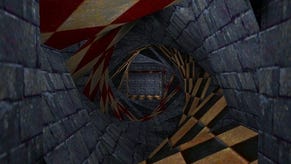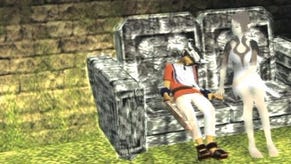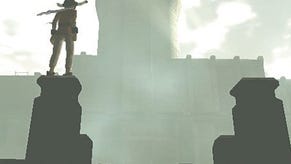ICO
Review - the purest form of entertainment
The Sun Is Shining
The air is filled with the sound of rushing water, hundreds of metres below at the foot of the cliff. There's a windmill just ahead of me, with a broken spiral staircase slumping apologetically into a pool of gleaming water. As I look around I'm dazzled by the sun and have to retreat a few steps into the shade to see properly. I've just beaten a severely irritating room packed with spirits of the netherworld, but this is far from a thankless task. The serene beauty of the scene before me, two hours into Ico's adventure, is one of the most spectacular sights ever witnessed in interactive entertainment, and this is nothing compared to the rest of the game. ICO was borne of an incredibly simple concept: escape. The huge castle in which the game is set was supposed to be Ico's prison and eventual tomb, the last chance for his community to purge itself of the burden of evil. Apparently children born with horns are no good, telltale sign of coming famine and desolation, and so Ico finds himself locked in a peculiar egg-shaped casket at the age of twelve, shut away in an enormous, impregnable but more importantly inescapable cliff top Bastille. When he finds himself the beneficiary of an unusual stroke of luck, however, he - and by extension the player - is offered the chance to affect an escape. Within a few minutes of escaping Ico comes up against a set of tightly locked doors, signalling the end of his good fortune. But not for long, as he spots a giant birdcage hanging from the ceiling of an enormous room, which, he discovers, contains the fetching princess Yorda, whose bizarre language is apparently incompatible with his, or indeed our own. Releasing her proves important, because some bizarre power pulses through her veins, and the distinctive doors barring the couple's path magically part at her very presence.
More Than Meets The Eye
It might not sound like it, but ICO is much more than a platform puzzler, and although it sounds like a simplified Project Eden or even an update of multi-platform classic Dizzy, it's definitely its own game. Developed by Sony in Japan, it stars two extremely anime-esque characters on a simple quest, battling to escape an ancient foe. The castle wants to keep its prisoners, and as we learn from what fragments of the story there are to put together, it places a particular importance on keeping Yorda. But this isn't about to stop Ico, as he runs through subtly detailed corridors, across bridges and along balconies, hangs from the edge of cliffs and swings from chains, all the time struggling to keep Yorda in relative safety and within easy grabbing distance. As the game's puzzles grow in complexity and become multi-faceted, often spreading themselves across several rooms, Ico is able to gain Yorda's trust by treating her with respect and helping her to solve problems she seems far too dizzy to complete by herself. Indeed, as the game wears on she will take leaps of faith and follow closely, whilst in the early sections the player has to keep a tight hold of her hand to get her to follow at all… Both characters are stunningly detailed and beautifully animated. Ico's horns poke through a little cap, giving the impression of a kid wearing a Viking helmet, and Yorda's dazzling, practically bridal white dress covers up all the important bits while seeming to float delicately on the light sea breeze. Her hair is brown with white twinges and hangs unkempt about her face, and along with a confused facial expression gives her a delightful unassuming beauty. Ico moves swiftly and responds instantly to control input, and it's clear in places that the developer has sacrificed the odd frame of superfluous animation to maintain this speed. Elsewhere he can leap dramatically in about a hundred different ways and catch handholds with chilling realism. Who needs motion capture with such stunning attention to detail? Keeping up her end, Yorda runs buckled forward slightly when he drags her along, with her little bare feet stumbling over uneven ground. The running animation is utterly realistic and truly a sight to behold.
The Dark Side
Along the way spirits of the netherworld, working under the instruction of a dark sorceress, fight Ico and try to drag Yorda back through dark portals. These spirits are portrayed as featureless bodies like silhouettes and shadows against the masonry and fight bodily for the young princess, with two gleaming white eyes the only sign of life about them apart from the unsettling music that betrays their coming. Ico can beat them with his wooden torch and later a sword, and although fairly relentless they are there mainly to stop players from leaving Yorda unattended for long periods of time. Slinging her over a shoulder and making for the nearest portal, the shadow beasts are a nuisance, but a necessary evil. The reason Ico's fight for freedom is so compelling is the way the game manages to reward the player over and over again. There is no HUD, no collectibles (apart from a few weapons) and no clichéd objectives list to scan every five seconds. The control system consists of walking, running, jumping, attacking, climbing and calling (or dragging) Yorda. Along the way Ico can operate switches and blow the odd thing up, and to help accentuate important details the camera can zoom in to give players a closer look, but on the whole the game is very simple and keeps its eye on the prize. The only way a game like this can hope to keep people coming back is through a creative reward structure. And the way ICO goes about it is ingenious. To begin with, Ico is trapped inside, with menacing, eerily spacious rooms and the odd beam of light penetrating the cloud cover and bursting through the windows. Before long, however, Ico is outside, looking out into the mist and facing the full force of a sun low in the sky, with gusts of wind billowing in the air and filling your ears with noise. As the player progresses, the sun rises in the sky and elicits stunning visual effects. The rays are soft and warm, and after a couple of hours you find jaw dropping, meticulously detailed areas packed with grass, water and failing masonry for them to embrace. Before much longer you're faced with ornate structures built outside the complex, teetering on the edge of enormous cliffs, and completing the puzzles within harnesses the light - what else - to help you open the main doors and perhaps venture one step closer to escape…
Gush, Gush, Gush
Complementing the peerless visuals with a measure of class is the aural side of things. I have already made mention of the excellent sound effects, but the voice acting is another highlight. Now, when I say "voice acting" I'm speaking vaguely, because none of the characters in ICO really speak English. Or Japanese. Or any other known language. In fact, although all are subtitled, most of the subs are incomprehensible squiggles with only a smattering of vaguely crucial plot information translated. And still, the tone of the gibberish Ico and Yorda spout to one another at irregular intervals is surprisingly emotive. You can tell if they are enthusiastic, excited, reluctant, even sad. Like the rest of the game, it's art. The difficult thing with ICO is that it's over very quickly. Trying to gauge whether or not a game is worth £40 to the average consumer is confoundedly tricky when the game in question is just such an amazing achievement; a step forward not only in platform and adventure games but videogame entertainment as a whole, but takes only a handful of hours to complete. My advice to those of you who haven't already dashed out to buy the game - which is sold in a special foldout presentation package with four postcard-type freebies - is to dash out and rent it, finish it in a couple of days and then decide whether the lure of second-time-through extras is enough to warrant a purchase. It will surprise you just how quickly time flies in Ico's world, and every time you reach a save point - a stone sofa upon which both characters must flop to be able to record progress - it seems unbelievable that it really has been going on for that long… One reason for this is that the game is tremendously varied in its puzzles, and even the very simple ones offer some sort of carrot on a stick to keep you going. ICO has been changed since its arrival in Japan and the States to include extra content, and once completed subsequent plays reveal what Yorda actually says, which is worth a second go all by itself. A much appreciated 60Hz display mode is also included in the PAL release. The reason I will keep coming back to ICO though, is the seamless and vivacious game world and the way everything consistently comes together in the nick of time. Even the solution to the most obscenely complex puzzle, consisting of multiple tasks in a number of areas of the castle, always seems to deposit our heroes in exactly the right place to continue their quest. There is never a question of bad design. This is the purest game I've played in years. Criticisms? Maybe the camera - controlled by the right analogue stick - could sweep back to Ico a bit quicker, but that's about it.
Conclusion
In an industry justly accused of leaning towards style over content, ICO is a beacon of light and a bastion of superb game design. Thrusting aside the seesaw of graphics and gameplay which seems to have emerged in recent years, ICO entertains consistently and effortlessly and rewards the player with more of the same. And although it seems strangely ironic to round ICO's time off with a cliché, if there is only one PlayStation 2 game you play, make it this one.
-








